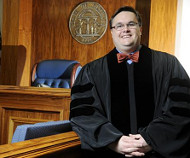8/26/2013
Georgia: Flashing Blue Lights Make A Traffic Stop InvoluntaryGeorgia Court of Appeals says state prosecutors strained credulity by arguing motorist could ignore police flashing blue lights.

When a police officer turns on his flashing blue lights and forces a motorist to stop, it is not a "voluntary" encounter, Georgia's Court of Appeals ruled last Wednesday. Jonathon Dryer found this out when he tried to drive his red Mercury Sable out of the parking lot of a local country club on April 4, 2010 at around 11pm. Because of the late hour, a local police officer had a hunch and turned on his blue lights before the Sable could reach the exit. Dryer stopped his car and the officer approached.
When asked what he was doing, Dryer explained that he had just used the restroom in a building near the parking lot. The officer smelled marijuana and asked for permission to search the Mercury. Dryer refused and a drug dog was sent to the scene, finding less than 2.5 ounces worth of marijuana -- mostly stems and seeds. A trial judge rejected Dryer's motion to suppress the evidence, ruling the stop was a "first tier" or voluntary encounter that did not require the police to have reasonable suspicion that a crime was being committed.
Under US Supreme Court precedent, police are free to approach anyone on a hunch and ask questions as long as the officer does not create the impression that the citizen is not free to leave. State prosecutors argued that Dryer's stop fell into this category, and he could have freely driven away from the officer even though the patrol car's blue lights were flashing.
"We disagree," Judge Stephen Louis A. Dillard wrote for the Court of Appeals. "While testifying during the motion-to-suppress hearing, the officer characterized his own actions as initiating 'a stop' when Dryer's vehicle attempted to drive past him. Thus, not only did the officer create the impression that Dryer could not leave, he clearly was not going to allow Dryer to do so... Given these facts, any argument that Dryer would have, nevertheless, felt free to ignore the police officer and continue driving away strains credulity."
As such, the appellate court found the stop required reasonable suspicion. The three-judge panel found no evidence that the country club was a high-crime area or any evidence of a crime recently committed there. Dryer did not violate any traffic laws, nor was there any reason to believe he was trespassing. The court reversed Dryer's conviction.
A copy of the decision is available in a 75k PDF file at the source link below.


